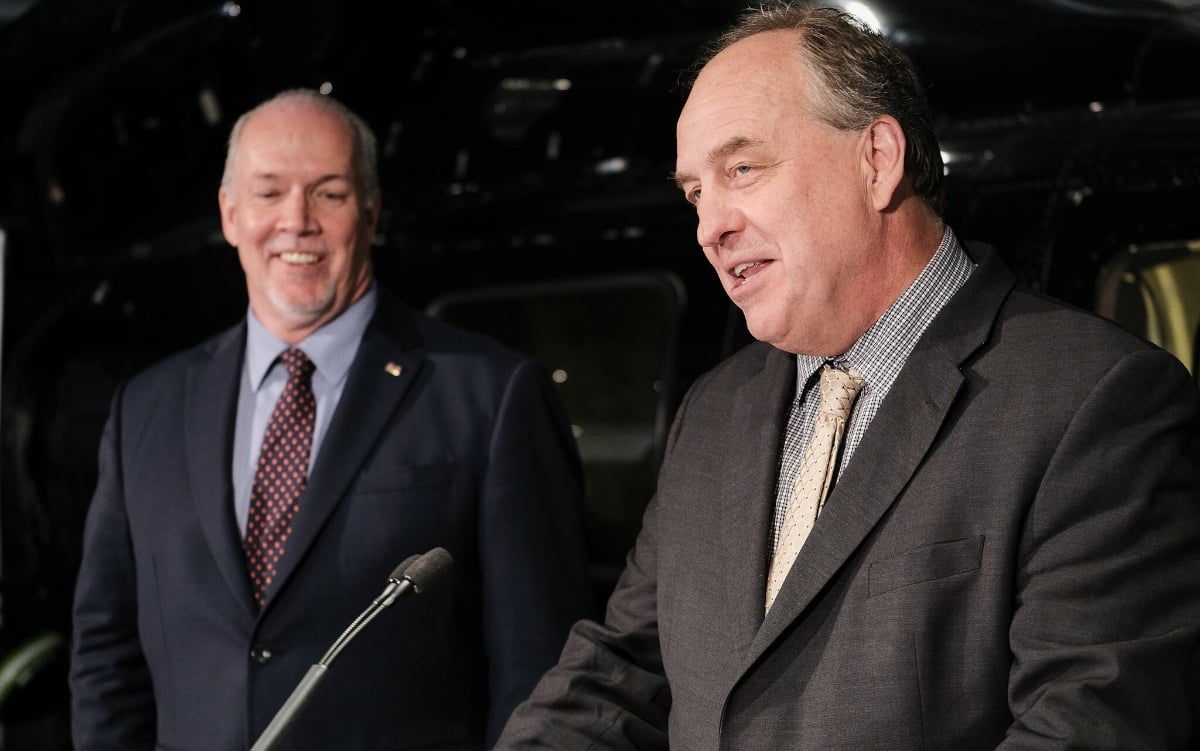Support strong Canadian climate journalism for 2025
If the BC Greens end up with the balance of power in British Columbia and choose to support the NDP, they are likely to push hard on two main climate policy issues — the consumer carbon price and liquid natural gas expansion.
These are two big policy areas where the Greens and NDP are far apart, said Kathryn Harrison, a political science professor at UBC, in an interview with Canada’s National Observer.
In this hypothetical scenario, the Greens might have some leverage to challenge Premier David Eby’s statements that his government will remove the provincial consumer carbon price if the federal system is scrapped by a future government, said Hamish Telford, associate professor of political science at the University of the Fraser Valley, in a phone interview with Canada’s National Observer.
The Greens are the only remaining B.C. party that supports the carbon price. The BC Green Party declined interview requests.
B.C. has had a consumer carbon price since 2008. Until recently, Eby supported the climate policy — before he pivoted in September, saying he would remove the province’s consumer price only if Ottawa did first.
Telford said the NDP likely recognize the carbon price is “good policy” and that, if pressured, they might renege on Eby’s promise.
The Greens and NDP are also miles apart when it comes to LNG.
The Greens’ election platform says under the party’s leadership, no new LNG projects would be approved and fracked gas production will be phased out entirely.
“The NDP's position has been that any additional terminals would have to be net-zero,” said Kathryn Harrison, in an interview with Canada’s National Observer.
“The Green position is so different from the NDP, which is basically we're going to worry about our emissions within British Columbia, the emissions downstream are someone else's problem,” Harrison said. Downstream emissions are created when fuel is burned — for example, in a vehicle.
“I don’t see the NDP backing down on LNG projects that are currently under construction, but the Greens might be able to hold out for a moratorium on future developments or at least for a more rigorous review process for new proposals,” Telford said.
“I am sure the Greens would want more, but the alternative is a lot less with the Conservatives, so they can’t afford to be dogmatic about it, in my view.”
Thomas Green, senior climate policy advisor for the Suzuki Foundation, thinks the Greens have a strong opportunity to at least force a pause on LNG approvals, similar to what happened in the United States.
Green can see a scenario where the party could force the hand of the NDP to launch a review of LNG in the province centered around a scientific panel to assess the economics and environmental impacts of increasing LNG production and exports in the province.
In their comprehensive platform, the Greens have a policy of conducting a “comprehensive and independent” health impact assessment to evaluate the health effects of LNG and fracking. The Greens have also committed to ending all subsidies to LNG in the province, which environmental critics of the NDP say siphon resources away from renewable energy industries and housing while spiking energy costs by diverting it to electrify LNG facilities.
There are currently only two LNG projects awaiting approval, the Nisga’a-led Ksi Lisims LNG, and the Tilbury LNG phase two expansion, said Kiki Wood, an oil and gas campaigner for Stand.Earth.
Along with pushing forward natural gas pipelines, the BC Conservatives would kill the government’s plans to electrify LNG facilities and scrap the emissions limits imposed on them.
“The NDP would be desperate for the help, but since it's not likely the Greens could work with the Conservatives, they don't have a whole lot of leverage with the NDP either, notwithstanding the NDP's desperation,” said Telford. Harrison agreed, adding that toppling the government too quickly would likely be unpopular with voters.
It’s likely that the NDP would seek a supply-and-confidence agreement, Telford said, because they “can’t afford to go issue by issue.”
Former Green Party leader Andrew Weaver thinks the BC Greens should hold off on inking a supply-and-confidence agreement until after the spring budget is tabled, partly due to the fact the party’s two new MLAs don’t have experience in the legislature.
“It's always good to keep people on their toes, so I would say right now, it's important that they signal that they're happy to make deals with whoever can express Green values,” Weaver said in an interview with Canada’s National Observer.
Weaver, a climate scientist, endorsed Conservative candidate Stephen Andrew in the lead up to the provincial election. As previously reported by Canada’s National Observer, BC Conservative Party leader John Rustad has a long history of doubting climate science and the need for climate action, going so far as hinting that climate policies are a plot to control people.
Harrison, on the other hand, believes the Greens would get the most bargaining power by laying out the things they will and won’t support and setting conditions for certain concessions, versus going vote-by-vote.
“They’ve each got strengths and weaknesses in their bargaining position, and it depends where they can find common ground and where the Greens might be able to push the NDP to do a little more.”
Weaver was leader during the NDP-Green confidence-and-supply agreement from 2017 to 2020. Some victories include passing the Declaration on the Rights of Indigenous Peoples and the CleanBC plan “that would never have happened if the Greens were not in the legislature,” Weaver said.
“They probably got more than we would have seen absent that agreement,” said Harrison. The Greens came out of the agreement looking like capable legislators willing to negotiate with the government, she said.
Natasha Bulowski & Matteo Cimellaro / Local Journalism Initiative / Canada’s National Observer







Comments
WHAT?? Andrew Weaver endorsed the CON candidate in this election?
And thinks you have to "keep people on their toes" so you can choose which party "expresses green values?"
Like these cons in particular are EVER going to do that!
Isn't there enough cognitive dissonance in politics already FFS?
Weaver's the kind of Green I don't like. He understands the climate well enough. He does not understand politics or ideology, or their relationship with climate. So he's trying to be an environmentalist and espouse neoliberal economics at the same time, and imagines this is viable . . . except, neoliberal economics is this construction designed to promote exploitation of EVERYTHING to put it in plutocrats' pockets, and that EVERYTHING includes the environment. I'm glad he's no longer leader of the BC Greens.
In general, though, I am quite pleased with the prospect of Greens having the leverage to push the NDP on issues like LNG. I still do not understand what the NDP has been thinking all these years in backing that crap. I think it has something to do with Moe Sihota.
Rufus it is so nice to hear neoliberalism being openly discussed.
Every Canadian issue today relates to 45 years of neoliberalism in Canada and the world! Health, housing, education, drugs, and homelessness +.
Every Canadian should be reading Invisible Doctrine The Secret History of Neoliberalism by George Monbiot 2024 .
I am willing to that not 1 in 50 Candians knows what neoliberalism means.
You're right, people much prefer the weeds given a choice....
And when the information/media zone is so "flooded with bullshit" at all times, another thing they don't know is a deliberate right wing strategy, not to mention changing civilization as we have all known it, we're sitting ducks....
Funny. My memory of marching from UBC to downtown Vancouver in 1984 to protest former BC premier Bill Bennett's neoCONSERVATIVE policies is still as sharp as ever.
Said policies took the form of massive cutbacks to social programs, selling off public assets to corporate donors, radically increasing public spending on coal mines and highways, building huge debt clearly from overspending (even after major cuts to medicare and education), and then lying about fudging the books.
That was the Milton Friedman Chicago School theory that made the infamous Trickle Down concept a houshold word, a theory that in reality trickled the wealth up even mor
The Solidarity marches led by BC labour unions garnered huge public support and nearly shut down the entire province. Bill Bennett caved on a few of his jackboot tactics and his days as premier were thereafter numbered. Still, the damage was done.
The entire episode came about when a popular right wing economic theory took over reason and excused a radical overreaction to artificially high US interest rates that affected the entire world.
Another one occurred in 2008 with US banks given permission to accumultate extreme levels of toxic debt. The banking sector was largely self regulating, and the appointed dudes meant to fix it did it by shovelling huge amounts of public cash to keep some banks afloat.
Neoconservatism / neoliberalism ....whatever handle you put on it, it's always ordinary people who get shafted.
Agreed. about Weaver. Remember that one Green leader, can't recall his name, who was a "business" type? I read at one point that the party actually skews conservative fiscally, but that was when the cons were still primarily relying on that ever more undeserved reputation as the best "managers of the economy." He might be a good example of an academic who bristles at being dismissed as ivory tower but is also rare and admirable both on his knowledge of climate change (he WAS a member of the IPCC, so more than "understands the climate well enough," credit where due) AND in his attempt to enter the political fray that the majority of academics smugly eschew to the detriment of us all.
What the NDP has been thinking all these years in backing that crap was Christie Clark's "Liberals" jumping on something considered new and lucrative at that time when everyone was talking "transition," also the time when the Liberals bought that pipeline, a time that everyone seems to have completely erased from memory for some reason....
The surprising fact that Clark is actually floating her name as "leader" of the Liberals is surely a non-starter, but also an ominous sign of the lines blurring politically and NOT in our favor since it skews right.
The Greens have indeed ended up in the best possible position for them, I'd agree. But in viewing the riding wins, they also split the vote in favor of the cons in several ridings, enough to have given the NDP a win, which is what really should be emphasized.
So bring on the scientists and academics, just not the defensive ones or arrogant ones who really seem to be "out of their lane" when it comes to a depth of understanding.
Elon Musk is a glaring and dangerous example of how consequential and dangerous that can actually be when he's the richest guy in the world...
One more issue: electoral reform. Replacing first-past-the-post with proportional representation for the next one or two elections and then putting it to a referendum.
Agreed.
Indeed.
One thing not mentioned is that the speaker of the house will be an elected member of the legislature. That person must be scrupulously neutral. That also means one less seat for whichever party.
Last time around the speaker came from the NDP's opponents, leaving the government with an additional seat in their already extremely slim lead. This time around, if the seat remains as it is after recounts and postal ballots are accounted for, the NDP will no doubt hunt for a PO'd blue liberal on the other side who didn't like how their former leader, Kevin Falcon, caved so suddenly to the Rustad Conservatives who are punctuated by extremists.
The online rumour mill speculated that Falcon was threatened by his former employers in the suburban development industry to fold his BC United Party and support the Conservatives to avoid splitting the right wing vote or he'll never work in development again, or something to that effect. Several BCU candidates expressed anger over that betrayal.
This would appear to offer the NDP an oppotunity to appoint a speaker from the elected ex-BCU MLAs on other side.
I haven't looked at the results very deeply yet, but it seems that the Greens split the progressive vote in some ridings, namely the two that are too close to call and subject to recalls. In addition, Green leader Sonia Furstenau, a very capable politico, was defeated in her Victoria riding by what appears to be a surge in NDP votes, probably because hundreds of potential Green voters saw a dark blue tsunami approaching in the form of well-oiled climate deniers and anti-vaxxers and switched back to reinforce the NDP seawall. If Furstenau was elected, the NDP would be only one seat ahead of the Conservatives instead of two.
Last time around the Greens were said to be actually physically repulsed by Christy Clark Liberals (who were in fact neocons). It stands to reason that the Greens will have an equally hard time getting behind Rustad's bunch of conspiracy floggers.
Had there been a proportional electoral system in place voters could have freely voted Green without fear of splitting the seat count which is already distorted by the current majoritarian inflation effect. Furstenau and probably a half dozen Greens would probably have been elected and be in a very strong position to mature and build up to a mature full on party capable of governing as a majority in future.
Right now premier Eby's job is on the line. He and his caucus should put the option if forming a true coalition with the Greens and give them a seat at the cabinet tabl
...table instead of trying to negotiate a weak supply agreement that could be broken at any moment.
Economics alone will deal with BC LNG in the early 2030s if not sooner. Reseachers already know this. And old growth logging needs be banned like yesterday before it's too late. Newbie Greens in an actual governing position in cabinet will quickly learn how vital consensus building and compromise really are, and how important building up ministry management skills will be.
I'm a little tired of the few Greens that have been elected becoming merely pragmatic. I wonder how long those who elected the two Green MLAs will put up with mere pragmatism. What is the point of incrementalism in policy influence when people who vote Green presumably want something substantial.
Rather than climate, which IMO is a federal battle, the provincial Greens ought to be focused (i.e. spend their capital) on provincial endangered species legislation in support of biodiversity retention in the province. If such legislation is worth anything, it will have ripple effects on other issues, such as climate, forestry, and fossil extraction.
I'm ready to see a Green leader who is up for a little brinkmanship; it's long overdue. Ms. Furstenau showed some chutzpah -- I've no idea if is was a wise calculation -- in running where she did; let's see some more attempts by the Greens to get away from merely supporting the biosphere-killing status quo.
PS. The second focus of the Greens should be a commitment for legitimate pro rep starting with the next election. No more committees or referenda. Get 'er done.